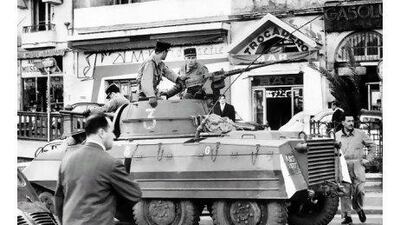MARSEILLE // Fifty years ago today, in the French alpine spa of town Evian-les-Bains, a treaty was signed to end 132 years of rule from Paris and set Algeria free.
The agreement formally ended a war of independence that cost, depending on sources, between 350,000 and 1.5 million lives.
But it did not put an immediate end to bloodshed, and certainly not to the bitterness and hatred the conflict aroused. Half a century on, the north African state still awaits the apology it believes it is owed by France.
On both sides of the Mediterranean, the anniversary is a momentous event. But although the Evian accord paved the way for independence - the French proclaimed a ceasefire the next day, March 19, 1962 - Algeria did not become a republic until after its own referendum, held on July 1, to accept the treaty.
So while the event has been marked by extensive media coverage in France, and numerous exhibitions, talks and commemorations, Algeria's own celebrations will await its national day, July 5.
The low-key approach was intended to reflect a mutual desire, expressed during a visit to Algiers by France's interior minister, Claude Guéant, in December, to avoid fuelling tension, especially at a time of elections.
France elects a new president on April 22 and May 6. Polling for Algeria's parliament takes place on May 10, with electors - including hundreds of thousands living in France - passing judgment on reforms introduced by the president, Abdelaziz Bouteflika, to pre-empt Arab Spring protests.
But Nicolas Sarkozy, seeking his second term at the Elysée, has shown no reticence in addressing the anniversary. In an interview with the newspaper Nice-Matin to coincide with a campaign visit to the French Riviera, he talked of the bloody consequences of a war that raged from 1954 to 1962, while insisting France owed no apology.
"There were abuses," he said. "Atrocities were committed on both sides. These abuses, these atrocities have been and must be condemned, but France cannot repent for having conducted this war."
This prompted Abdelaziz Belkhadem, former prime minister and leader of the National Liberation Front party that forms part of the ruling presidential alliance, to say France would ultimately have no choice. "Whether President Sarkozy accepts it or not, the day will come that France will apologise for what it has done in Algeria," he said.
Mr Sarkozy's stance reflects France's uneasy relationship with its colonial past but also his push for the "Harki vote".
The Harkis were Algerian Muslim volunteers who served France in both world wars and then in trying to quell the Front de Liberation Nationale (FLN) rebellion in Algeria. In 1961, it has been estimated, there were 210,000 Algerians in the French army, more than four times the strength of the FLN.
After independence, they were treated as traitors in their own country and made unwelcome in France. The lingering resentment they and their descendants feel is a recurring feature of French politics.
And with Mr Sarkozy now showing the first signs of rallying in the presidential race, luring the Harkis and the pieds-noirs - the families of Europeans who also fled to France after the conflict - from the far-right Front National (FN) could make a difference.
Much of the French media coverage has presented an even-handed picture of the period leading to France's surrender of its most prized African possession.
In an evening devoted to the subject, the television channel France 2 showed horrific footage of the Philippeville massacre, when 71 Europeans and 52 Algerian Muslims were slaughtered by the FLN in 1955.
But the distressing scenes of the carnage were followed by clips of French soldiers shooting unarmed rebel suspects as they raised arms in surrender.
Nationalist sentiment had been rising in Algeria since the Second World War. In 1950, the population was estimated at eight million Muslim Algerians, most living in poor conditions, and under a million Europeans enjoying a vastly superior standard of living. L'Algérie Française was a good place to be for a pied-noir.
It could not last. The FLN announced on October 31, 1954, that it intended to seek independence "by any means". Bombings soon began; killings of Europeans, mainly of French origin, rose from five a month in 1955 to 50 within two years.
Gen Charles de Gaulle, the French president, finally declared Algeria independent on July 3, 1962. Fewer than 20,000 Algerians among six million voters had opposed the transition in a referendum; France's own vote, three months earlier, had been almost as emphatic.
But even after independence, the killing continued. The FLN targeted Europeans and Harkis; the OAS, a far-right French terror group inspired by the slogan "Algeria is French and will remain so", mounted attacks on the FLN and even tried to assassinate Gen de Gaulle in Paris.
"It is a big problem in France trying to determine the date by which the conflict should be considered to have ended," said Dr Jim House, an authority on Algeria and director of the centre for French and francophone cultural studies at Leeds University in northern England. "Thousands died even after the Evian agreement."
As well as the murders of pieds-noirs, OAS terrorism and the killing of Harkis, there was infighting among the nationalists.
Three decades later, when internal tensions exploded into civil war between the government and Islamist rebels, 11 further years of bloodshed caused at least 150,000 deaths.
Algeria is again at peace. But Dr House says that as the passage of time robs the older generation of leaders of the legitimacy of the war of independence, the young are looking for greater democracy and economic progress.
"There are serious levels of poverty and disappointment and people do not trust the politicians to deliver meaningful improvements to their lives,' he said. "It is not a poor country but the resources have to be invested in housing, infrastructure and other socially beneficial programmes. And whether that will happen is another question."
foreign.desk@thenational.ae


